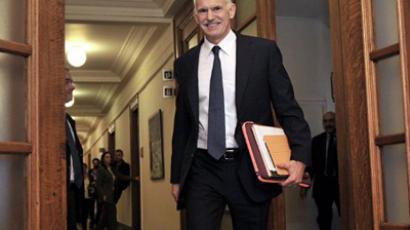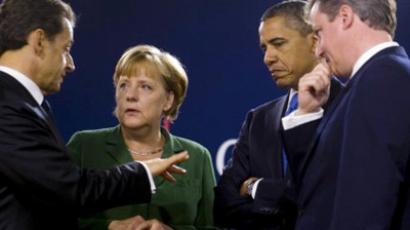‘Politicians can’t control Euro crisis’
As Greece awaits the formation of a new "unity" government, Arjo Klamer, chair of economics at Erasmus University in Rotterdam, told RT that even if the new coalition is formed, it is unlikely to make any difference.
“The big problem the Greek government has is to get its population behinds its plan. And it doesn’t seem that the people in Greece are willing to put up with all the measures that are being taken,” he explained. The Greek PM must resign – that is the demand of the country’s opposition, if the political deadlock is to come to an end. The head of Greece's main opposition party said George Papandreou was "dangerous" and has called for early elections.According to senior government officials, Papandreou could announce his resignation later on Sunday, hoping it will pave the way for the formation of a coalition government. Meanwhile Athens is fast running out of time to implement a crucial EU bailout plan intended to save the country from bankruptcy.If George Papandreu resigns in the next few hours, this political solution will not do much good for the situation in Europe as a whole, believes Klamer. “The Greek are rather disturbed, even though they say they want to hold on to the euro, they do not want to put up with the measures being imposed on them. The new government can create some sort of solution for some time, but the resistance is building up and then I see that the same thing is happening in Italy where they also have to take measures that the Italians are not willing to live with,” he stated. “I don’t think the politicians have the measures and instruments to control this crisis,” he added. In order to get the bailout money Greek politicians have to push on with these measures which, Klamer maintains, are drastic. “We call it a cold turkey approach. It means reducing salaries and government spending, causing a lot of hardship among the Greeks. That’s the price they have to pay for the euro. And whether the Greeks want to go along with it is doubtful. If it does not work, and all politicians understand that, then there will be serious consequences not just for the Greeks, but also for the banks which may go bankrupt if they Greeks themselves go bankrupt,” he pointed out. Papandreu shocked EU leaders by announcing a referendum, resulting in the threat of being kicked out of the EU, but France and Germany still seem set on saving Greece. In fact, it is not Greece they want to save, but their own banks, explains Klamer. “Greece is too small to care about, but it is a threat for the European economies because German and French banks are heavily involved in Greek debt, so they are really concerned and in this case they were so strict about it because they saw that the referendum would push the whole thing forward,” he concluded.














